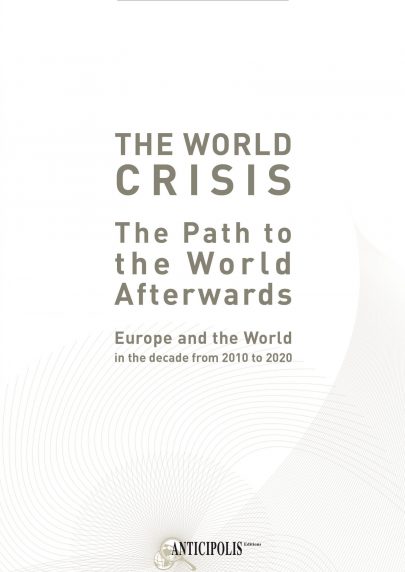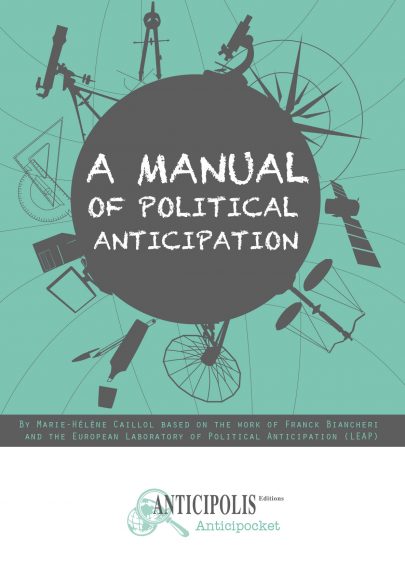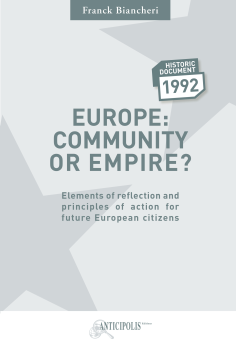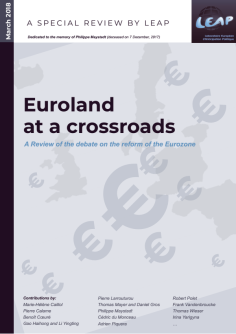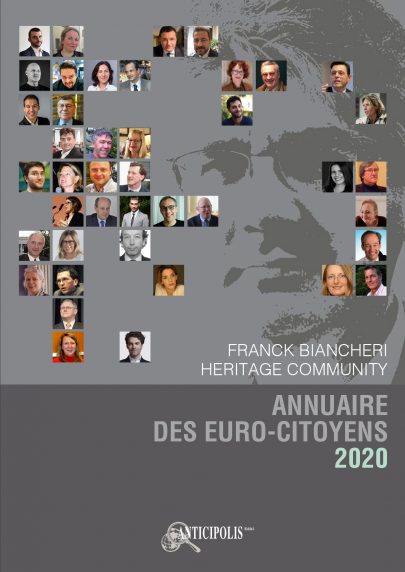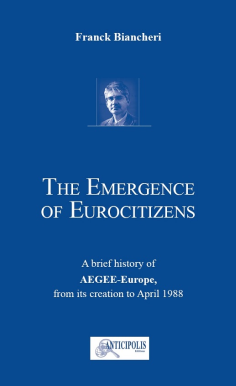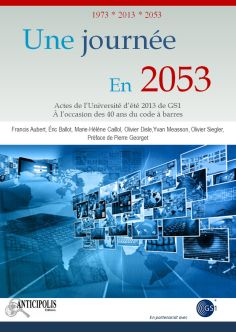GEAB 89
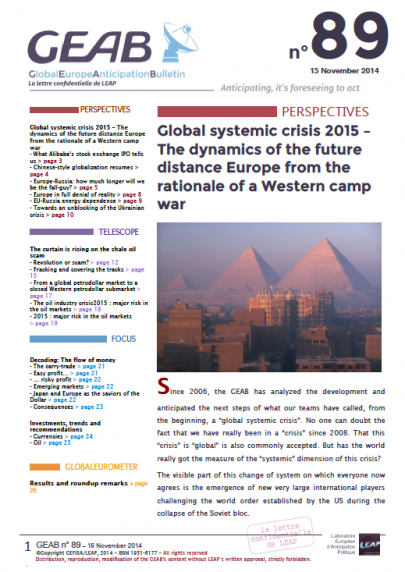

Since 2006, the GEAB has analyzed the development and anticipated the next steps of what our teams have called, from the beginning, a “global systemic crisis”. No one can doubt the fact that we have really been in a “crisis” since 2008. That this “crisis” is “global” is also commonly accepted. But has the world really got the measure of the “systemic” dimension of this crisis?
The visible part of this change of system on which everyone now agrees is the emergence of new very large international players challenging the world order established by the US during the collapse of the Soviet bloc.Thus, in the GEAB, for a long time we have been speaking of this strong trend of the world’s multipolarization demanding reform of the existing international authorities and/or, in case of failure on this point, inventing a new world governance (a process of invention in which we consider that Europe has an historic role to play given its unique experience of integrating state entities of different sizes and kinds).
But it’s another strong trend, the Internet, of which everyone will admit its deeply restructuring character, which beyond its contribution to the facilitation of trade and economies’ globalization, de facto connects the whole of humanity in one organic social body thanks to a network “system” profoundly different from the pyramid systems inherited from the 19th century which founded, yet always officially, our national, international and supranational socio-politico-institutional “systems” (1)
These two combined major trends helped to give an idea of what tomorrow’s world would look like: a global social networking body largely self organized and for which the institutional-political model of governance remained to be invented. One perceives from this statement the problem which confronts the world that the model will consist of small, flat, political coordination structures (2) integrated with human networks matching their administrative expertise (3).
But before this system is formalized, the challenge is to integrate these dynamics of the future with the old pyramid system… or get rid of it. Our team believes that the world is currently witnessing this combat: the tenets of empire versus the combination of mutually independent political entities, representative democracy versus direct organized citizen participation, pyramids versus networks, militarized colonization versus globalized regulated trade, national systems versus post-national ones, oil versus renewable energy, a cumbersome economy versus a digital one, banks versus financial flows, employment versus online professional activity, UN institutions versus the BRICS club, etc.
The players of the world before, mainly due to a complete misunderstanding of the motivating features of tomorrow’s society, currently fall back on all the classic tools of domination (finance, military, religion or ideology) to block the world’s “natural” evolution. This fight is doomed to failure, that is certain, but according to the speed at which these players blend in to the new style of organization, the damage inflicted on humanity could be considerable.
It’s in this landscape of the world’s systemic transformation that our team wanted to plant its usual analysis of recent news: China and the BRICS’ influence on economic and geopolitical news, the end of the Euro-Russian stalemate in the middle of the Ukrainian arsenal, nation-states’ heart-attack in Europe, hope of resurrection through the European level.
Chinese-style globalization resumes
And it works! Last month our analysis was of a world that had become Chinese. This month a number of international events show us what this fact changes in terms of global governance:
. for the first time, the US has agreed to reduce its carbon emissions by 28% by 2025 as part of a US – Chinese agreement on global warming (4) . We note in this agreement that it is actually much more restrictive for the Americans than for the Chinese who are only committed to reverse the growth of their emissions in 2030! Even if it’s likely that Congress refuses to vote for such a strategic change of course, this agreement constitutes the first of its kind where bilateral negotiations involving the US are concluded to the other’s advantage. This agreement also incorporates a principle of reality: the Chinese emit 7 tonnes of CO2 each year whilst the Americans emit 16. For a long time, everyone has known that it was for the US to make a real effort; but for a long time the US has preferred to put forward cumulative emission figures for the whole of China with the real objective of using the environmental agenda to lobby against China’s development and the explosion of its oil consumption (likely to push prices too high).
. last week, the APEC summit held in Beijing on 8 – 10 November marked significant progress in all areas and China’s leading role in these dynamics (5) : the US-China environmental agreement which we have just mentioned, but also the broad liberalization of trade with agreements on visas, currencies, security, the environment and trade between the US and China, a free trade agreement between China and South Korea (though a strategic ally of the famous US “pivot” in Asia), calming elements in the territorial disputes between China and various South East Asian countries (the Philippines, Japan, Vietnam) where, in some cases, Shinzo Abe’s goodwill calmed things down. De facto, the globalization agenda has resumed, led by China this time, which changes everything.
. on the sidelines of the APEC summit, this time its China and Canada agreeing on $2.5 billion in contracts and Yuan currency trades. If, last month, Europe and Russia had been the object of the same charm offensive by China, this month it was North America’s turn… with the difference that the Chinese didn’t need to go to them, it was the latter who went to China.
. even the ASEAN summit of 9-13 November in Burma, a minefield for the Chinese given the importance of the territorial disputes in the China-ASEAN relationship, enabled the confirmation of important positions for resolution, starting with the recognition of the Chinese legitimacy to call for bilateral settlement of these disputes (6) , a China-ASEAN friendship treaty, all helped along by a $20 billion loan from China…
. the G20 summit the 15-16 November in Brisbane, Australia has the declared challenge of finally initiating a reform of the international organizations as evidence of its usefulness. The G20, as the representative defence walls of the 21st century world, will not survive a failure on this point. With this fully legitimate ultimatum, the BRICS thus take control of the G20 agenda which is seeing itself dragged into a search for a solution to the US Congress blockade over IMF reform in particular (ahead of giving the emerging nations and increased role and doubling its capital (7) ). The method of solving this blockade is even planned: a clever division of the reform objectives instead of a bloc reform project will allow their voting in by a majority and bypass the US right of veto. The challenge is there, as well as the solutions; let’s wager that even the G20 is likely to finally produce results under BRICS steering at the end of 2014.
. as regards the WTO, there is India’s resounding victory which managed to impose its views in the negotiations of the Bali agreements. Without even any need to rewrite the agreement, India has seen its conditions of non-questioning its food security programme accepted and can sign the agreement. It must be said that the WTO’s survival depended on this agreement (8) .
. as regards Iran, the Russians and Chinese, as well as the Germans, played a strong role in the negotiations to obtain an agreement on the 24 November finally allowing the deadlock to be broken, lifting sanctions, and allowing Iran to make its entry on the international scene… and to play the role which behooves it in Middle East pacification. We anticipate that, despite the difficulties (9) , agreement will be well and truly reached on the 24 November.
All this in just one month! The world seems to have restarted, led by the dynamics of the emerging nations. It’s multipolar, peaceful, open, and the West has its place there too.
———-
Notes:
(1) In this terminology we note that the nation-state always constitutes the final institutional-political reference point.
(2) Whose democratic legitimacy remains to be invented.
(3) By way of example, the European Community’s Secretariat for political coordination could be a small decentralized entity (made up of a handful of individuals who don’t even need to have a common workplace) working on a network to coordinate the implementation of the actions agreed within the framework of a legitimate, decision-making system (our aim here is to show how the system in 2030 would be different to the current one, not to give a picture of how it will be exactly).
(4) Source : EUObserver, 12/11/2014
(5) This article in the The Economist (15/11/2014), which follows the same lines as we do, is worth reading.
(6) Sealing off US interventionism (especially) in this area. Source : Reuters,13/11/2014
(7) Source : China Post, 09/11/2014
(8) Source : Deccan Chronicle, 14/11/2014
(9) The GEAB September issue in particular gave a detailed analysis of the importance of integrating Iran into the Middle East peace strategy.

Revolution or scam? Fracking and covering the tracks From a global petrodollar market to a closed Western petrodollar submarket The oil industry crisis2015 : major risk in the oil markets [...]
The carry-trade Easy profit… … risky profit Emerging markets Japan and Europe as the saviors of the Dollar Consequences Investments, trends and recommendations Currencies Oil

